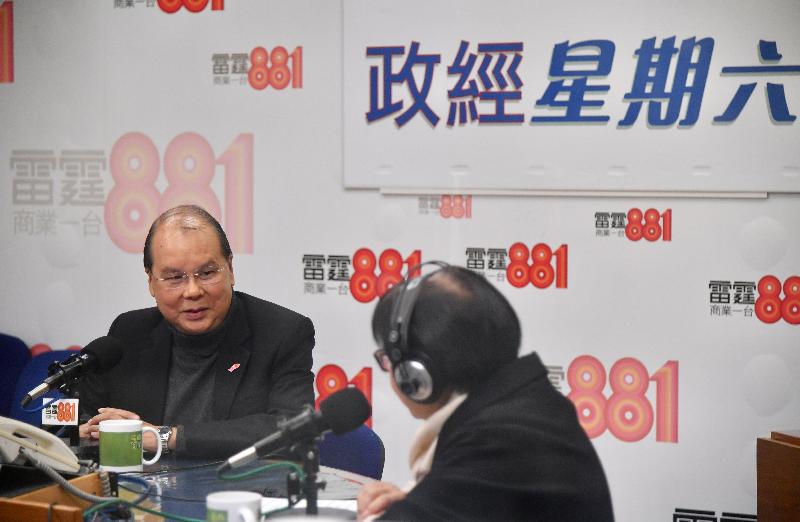Transcript of remarks by CS at media session (with photo/video)
Following is the transcript of remarks by the Chief Secretary for Administration, Mr Matthew Cheung Kin-chung, at a media session after attending a radio programme this morning (January 18):
Reporter: So what about the walkout by the DO, the District Officer in Central and Western District Council (DC), and do they violate the neutrality rules of civil servants? And my second question is, you mentioned the relief measures are actually not relief measures, they are like in-depth reforms, could you explain a little bit more?
Chief Secretary of Administration: Let me deal with the second question first. The ten measures proposed by the Chief Executive are meant to be institutional changes, not one-off relief measures. Unlike the Financial Secretary's relief package, which is meant to be one-off measures. It is really meant to tackle long-term problems, for example, in retirement protection, by making uniform for the higher rate for everybody – for the Old Age Living Allowance, is a major step forward in improving old age protection, particularly retirement protection on that score. So we are talking about also increasing substantially the asset limit for applicants under the Old Age Living Allowance, again another very important breakthrough, which will benefit, we reckon, 150 000 people eligible for these particular relaxation – very important step forward. Together with the annuity available in the market, if one, for example, buys annuity up to, say, half a million dollars of savings, keep the other half of million dollars, because the asset limit is up to half million dollars, he or she can get $2,900 extra per month in terms of annuity, on top of the $3,585 Old Age Living Allowance, the higher rate now applies across the board, he will get probably close to $7,000 a month – this is not bad at all for an old age, particularly old-aged pensioner. So we are talking about moving a big step forward in terms of retirement protection, not a one-off relief measure, not Panadol, we are talking about long-term solutions here.
The concessionary public transport fare system (the two-dollar travel scheme) also benefits 600 000 more people aged between 60 and 64. This is very important, particularly facilitating them to widen their social circle, even work in this way, and also to be more active in their so-called retirement age – those retire in their 60s, so again another major step forward in terms of retirement protection and also in terms of enhancing the well-being of the elderly.
The first question relates to the so-called response of the District Officer, in response to two cases – one is in Tai Po. In the Tai Po case, in fact the District Officer has sought advice from the Department of Justice, on the legality of the terms of reference of the proposed sub-committee, and the advice was quite clear that it was ultra vires, in other words, went beyond the ambit of the District Council. Therefore, it will be unreasonable, inappropriate for District Officers, and also government officials to participate in these sub-committee. It is a pretty clear question.
The second issue relates to the Central and Western DC. Again, the Commissioner of Police (CP) spent over an hour answering questions from all fronts in very detailed fashion, and at the end, he made it quite clear a lot of the allegations are not correct, are not true, not substantiated, which means that the motion reprimanding him and the Police Force are totally unfounded. He therefore had to withdraw from the meeting. On that point, in fact, the DO also withdrew for very good reason, because we are one government, alright? You can't have a meaningful discussion when the facts are not substantiated. When the CP made it quite clear that it's not true, alright? He would not join the follow-up discussion. It was entirely reasonable and appropriate for the DO to take the step that she did.
(Please also refer to the Chinese portion of the transcript.)
